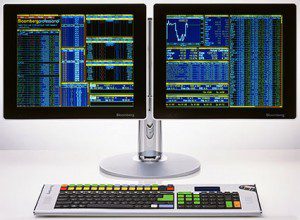I firmly believe that most top executives need a digital sherpa, someone who personally takes them through the first steps on the road to understanding the digital mindset. It’s one of the defining elements of the iPhone which, because it doesn’t come with instructions and has a truly distinctive functionality, literally invites people with a shared curiosity to share tips and tricks with one another — even among total strangers. As a precondition of success, the digital sherpa must have or at least gain the leader’s trust.
A whole new mindset
Business people — specifically most of today’s top executives — in many parts of the world were brought into the mobile world via the Blackberry and to the computer via the PC. As a result, they barked up the wrong end of the stick when considering mobile revolution. To make a parallel, it’s like thinking a Bloomberg Terminal is similar to the Internet. Not only is it limiting in scope, it misses out on a lot of the functionality and emotion. Executives using tools and interfaces like the Blackberry, PC and Bloomberg (in the financial markets) perhaps thought that they were “getting” the digital mindset — at least enough to manage the new wave. Blackberry was coveted for its keyboard that helped with typing emails – two very limiting views of the new tech environment in which we now navigate. Bloomberg provides a curated space with all the financial information in one place (albeit multiple screens!); however, its interface remains extremely dry. Whether a business Blackberry or a Bloomberg screen, there is an inherent need to be proprietary that obscures people’s desire to share what is on their screen (using the attitude that ‘information is power’).
- Why bother spending time learning other systems when, up until now, I was getting along just fine without?
- What’s the big deal with these new apps? They all seem to come and go, so there’s no use staying up-to-date.
- Social media is just for the kids, isn’t it?
- Shouldn’t it be the marketing department’s responsibility?
- All we need to do is hire a geek to be our Chief Digital Officer.
- I don’t trust any of these internet “giants.”
- No one gives me a straight answer about the Return on Investment of all these digital tools!
- Worst case, can’t I just hire an able assistant?
It’s not that today’s management doesn’t believe that digital is important for the business. It’s just that they mistake digital as being a set of new tools/devices/platforms and completely underestimate the mindset shift that needs to accompany the digital transformation.
The leadership’s digital IQ
One of the big questions I often hear regards to what extent the leadership needs to “be” digital. Does the leadership team need to have an elevated digital IQ? But, what is a digital IQ? In reality, it is not a number on a scale of 0 to 150 of how much you know about digital tools, new technologies and platforms. Companies are pressing ahead with “Digital Academies” and digital training programs. The problem is that this “education” tend to focus on digital competency. But, competency is really only a part of the equation. Although an organization needs to find ways to know about the tools and platforms and to stay up with the changing technological landscape, a proper digital IQ is more a question of mindset. It’s probably closer to a Digital Emotional Quotient (EQ). In any event, given the scope of digital and its ability to impact all industries and function, no single person is able to stay on top with the ongoing digital revolution everywhere, in every sector, all the time. A high digital IQ has, at its core, an ability to keep learning all the time.
“I am always doing that which I cannot do, in order that I may learn how to do it” – Pablo Picasso
The digital mindset – the right footing
To get off on the right footing, I suggest visiting the checklist below. The right digital mindset for an executive is some combination of the following traits:
- The learner – as much as all big bosses need to provide direction and vision, they must also be the first to recognize with humility their need to be curious, open to learning from different types of sources.
- The explorer – for example, someone who tests apps him/herself, tries out new technologies when they come up.
- The sharer – who is keen to share what he/she finds of noteworthy.
- Obsess with the user experience - to the extent design is a critical part of a good user experience, we need to be detail-oriented.
- Experiment and be prepared to make mistakes – without this attitude, it will be difficult to get started.
- Have some fun and be prepared to revisit some of those long-held beliefs!
In tackling the digital mindset and, what some feel is, the digital mountain, organizations can only truly embark on digital transformation when the top management understands and models the appropriate behaviors. As Jeff Bullas wrote recently, leaders need to unlearn many old habits and beliefs and start to practice some new behaviors, learn some new tools. And beware: the journey is long.
Your thoughts?











